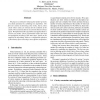Free Online Productivity Tools
i2Speak
i2Symbol
i2OCR
iTex2Img
iWeb2Print
iWeb2Shot
i2Type
iPdf2Split
iPdf2Merge
i2Bopomofo
i2Arabic
i2Style
i2Image
i2PDF
iLatex2Rtf
Sci2ools
117
click to vote
RTSS
1996
IEEE
1996
IEEE
Reducing the number of clock variables of timed automata
We propose a method for reducing the number of clocks of a timed automaton by combining two algorithms. The first one consists in detecting active clocks, that is, those clocks whose values are relevant for the evolution of the system. The second one detects sets of clocks thatare always equal. We implemented the algorithms and applied them to several case studies. These experimental results show that an appropriate encoding of the state space, based on the output of the algorithms, leads to a considerable reduction of the memory space allowing a more efficient verification.
Related Content
| Added | 07 Aug 2010 |
| Updated | 07 Aug 2010 |
| Type | Conference |
| Year | 1996 |
| Where | RTSS |
| Authors | Conrado Daws, Sergio Yovine |
Comments (0)

